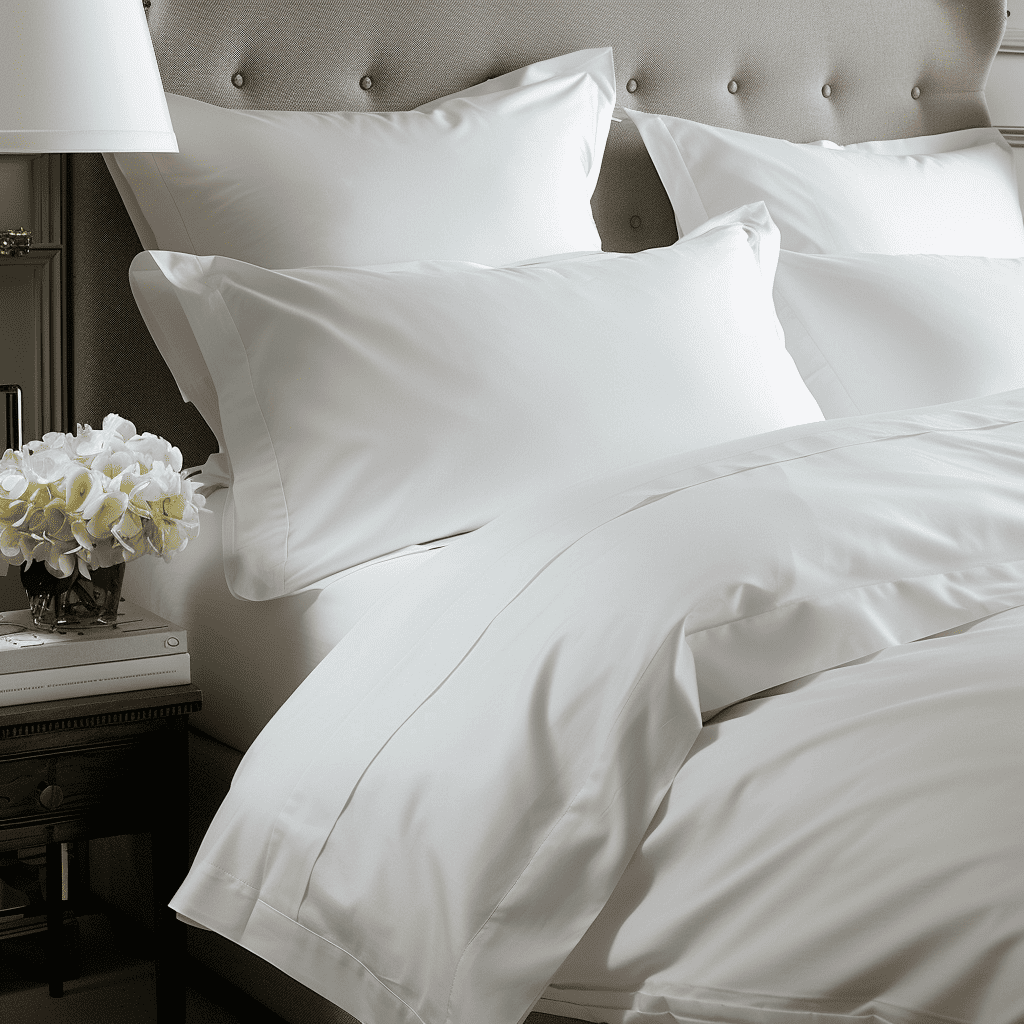During our investigation, we looked at multiple aspects, such as resilience, the level of comfort, breathability, ease of cleaning, cost-effectiveness, and positive feedback from customers, among others. A restful night’s sleep is essential to wake up rejuvenated for the day. Uncomfortable sheets, however, can be disruptive and lead to frustration. Lack of adequate sleep can contribute to various problems like allergies and respiratory issues. Organic cotton sheets can significantly enhance your sleep experience. Given they are made from organic materials, there is no need to be concerned about harmful chemicals that might endanger your health while sleeping on these cozy, comfortable sheets. Additionally, cotton sheets are breathable, lightweight, and easy to clean and reuse.
Our Recommendation 🇺🇸
Pure Bamboo Sheets

Made from top-notch 100% organic bamboo, Pure Bamboo’s premium bed sheets hold the OEKO-TEX Standard 100 Certification. This means they’ve been checked for more than 100 harmful substances, guaranteeing a safe, health-conscious, and eco-friendly choice for your loved ones. These sheets are exclusively made from bamboo and don’t mix with other materials or textiles. Additionally, the bamboo fabric naturally adjusts temperature, ensuring you stay cool and comfortable during sleep throughout every season. Those with delicate skin will appreciate the moisture-wicking quality of this resort-grade bedding. In terms of softness, Pure Bamboo Sheets are second to none.
Organic Cotton Sheets Purchasing Guide
Cotton is a complex fabric to handle, more so when it comes to bed linens. The typical cotton sheet is bleached and dyed, undergoing numerous hazardous chemical processes before it reaches your bed, which can be harmful to people with sensitive skin. Organic cotton sheets are produced by farmers who use natural substances for cleaning and dyeing, creating a healthier and less damaging experience for consumers. But there are still several things to consider before buying your own organic cotton sheets. Here are a few of them.
Cost
Although we may wish to splurge on a luxurious set of sheets, it’s crucial to stay within our budget. Expensive doesn’t necessarily mean better quality. There are many premium options available at lower price points that you can explore when shopping for organic cotton sheets. Wanting luxurious sleep doesn’t mean you should deplete your savings.
Longevity
Consistently replacing sheets isn’t practical. The durability of cotton sheets is crucial. As these sheets are made from delicate fabrics, it’s essential to know their lifespan before they begin to degrade. Fabric pilling can also make the sheets less comfortable. To get the best value for your money, invest in sheets that will last you a long time.
Breathability
Sleeping in overheated sheets is decidedly uncomfortable. Breathable sheets offer a cooling sensation, ensuring you don’t sweat excessively during your sleep. Moreover, breathable sheets minimize the likelihood of odors as sweat doesn’t accumulate in the fabric. For optimum comfort during sleep, it’s critical that sheets are breathable. Otherwise, you might as well be sleeping in a furnace.
Ease of Cleaning
Spending long hours removing stains and dirt from sheets is not something anyone wants. The ease with which a sheet can be cleaned can influence a consumer’s purchase decision. Certain sheets on the market are washing machine friendly, making them easier to clean and reuse. Typically, these sheets are also lightweight, which aids in drying them faster. When selecting sheets, opt for ones that are easy to maintain.
Quality
Quality is related to the thread count and how a sheet compares to others in the same price category. High-thread-count sheets offer excellent comfort but can be slightly more expensive. In contrast, there are durable and lightweight sheets that are easy to clean, but they might have a lower thread count, making them less soft and comfortable. Ultimately, the choice depends on individual preference and priorities.
Additional Features
Getting value for money is everyone’s goal when purchasing a product, and cotton sheets are no exception. Extra features can include cooling capabilities, design aspects, and the thickness of the elastic. These features are designed to meet various needs, so your preferences may differ from others. However, these additional features can be beneficial when looking at sheets to add to your collection. The cotton industry can be difficult to navigate, especially with companies selling cotton sheets that have been treated with harmful chemicals. Organic cotton sheets, however, eliminate this risk, providing consumers with a safer choice. They are an excellent alternative to conventional cotton sheets, which may have been exposed to harmful dyes and chemicals.





